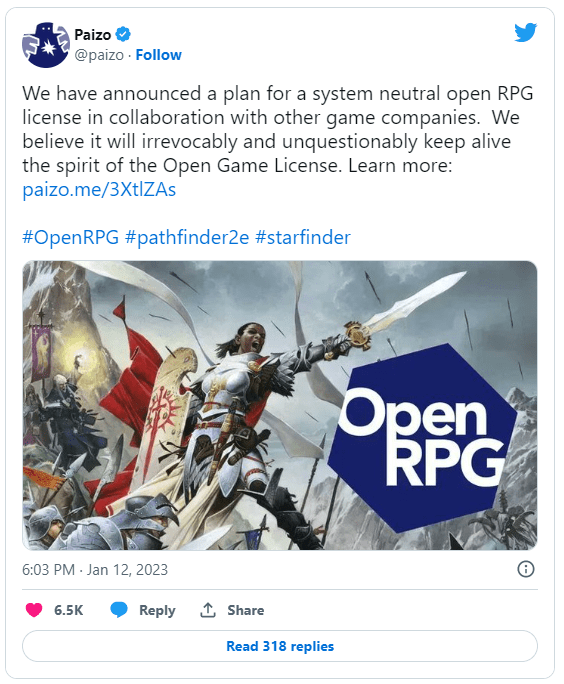If you enjoy this post, please retweet it.
Yesterday, Paizo announced that they were developing a “system-neutral, open RPG license.” It’s overwhelmed with traffic, so you’ll have to be patient when trying to load it. They had a form for volunteering to review it and give feedback. After I signed up, I noticed some text that said it was for game designers only, so I doubt I’ll get an advanced copy for review. Maybe that’s a good idea considering my initial impression.
Same Old Song & Dance
As I’ve been running into the ground for well almost 15 years, the OGL isn’t a real license, and claiming it is has done a lot of damage that we’re finally seeing manifest in real harm, which I predicted. You can’t say I haven’t been warning you that this day would come. Talking about irrevocability or any other concept that applies to contracts shows that you’re missing that critical point, and that’s exactly what Paizo does in this announcement.
We believe that any interpretation that the OGL 1.0 or 1.0(a) were intended to be revocable or able to be deauthorized is incorrect, and with good reason.
Unless their position is that those interpretations are incorrect because they simply don’t apply to non-contracts, then they’re advancing the same false narrative that Wizards of the Coast (“WotC”) has since at least 2004. The fact that they intend to state their proposed consideration in a separate document suggests that we’ll be dealing with a “contract” with far too much uncertainty as to what it actually licenses. Maybe it’ll be an unmalleable appendix rather than a separate document — we don’t know — but everything I read in that press release leaves me pessimistic.
Remember, the OGL should have been an acknowledgement of the material WotC conceded they didn’t own. If they wanted it to be a real license, then it must be 1) specific about exactly what material the public now use, and 2) that material must be material the public otherwise wouldn’t have been able to use. That is, the consideration must be both obvious and real. Any other approach with Paizo’s license will mean that Paizo is continuing to feed the public that false and dangerous narrative. Granted, no one’s going to die because of this, but people’s livelihoods are on the line, so “dangerous” fits in that context. If you continue to buy into it this false narrative, you’ve learned nothing from the turmoil the OGL has caused, but you can’t blame WotC for it any longer. Like the danger from cigarettes, the information is out there, so it’s on you if you accept the risks.
And now we finally have WotC’s official statement, which demonstrates a victim complex. They 1) still intend to treat it as a legitimate license (of course); 2) act as if, on the week the final copy was to be distributed, that they were always just looking for feedback; and 3) overfocus on the non-discrimination provision to which no one objected, all to make themselves look like the good guy. Additionally, as Stephen Radney-MacFarland pointed out, you expect us to believe that they “didn’t see this coming”? Unbelievable, and yet paradoxically exactly what we expected.
But It’s Pazio!
You may believe Paizo’s promise of irrevocability even though it wouldn’t be legally enforceable. Some of the readers of this blog know Paizo management personally, so maybe you’re right for trusting them. But consider this: What if Hasbro’s chief rival, Mattel, decides to take advantage of Hasbro’s tarnished reputation and enter the RPG market? What would be their best way to jump start such an effort? If I were them, I’d buy Paizo, and if that happened, would you still trust Paizo to do the right thing? Do you know any Mattel executives? Would that even matter? Would a $7.18 billion business never change course because they’re a “nice bunch of guys”?
Still, everyone, including me, should give Paizo a chance. Maybe they’ll surprise me despite this reckless language.
Let’s see what they actually do.
Follow me on Twitter @gsllc
Follow Paizo @paizo
Dungeons & Dragons is a trademark of Wizards of the Coast, LLC, who neither contributed to nor endorsed the contents of this post. (Okay, jackasses?)
In case the tweet is ever deleted, here’s a screenshot.


A lot of people seem to be under the impression that the promise of not being sued constitutes valid consideration. To go back to an example you used in 2019: https://gsllcblog.com/2019/08/26/part3ogl/
If I write a contract that says “you agree to paint my house, and in exchange I give you the right to paint your own house,” is that a valid contract, even though it’s incredibly stupid? The right to paint your own house isn’t mine to give, but what’s really being offered is the promise that I won’t sue you over it, even though I would likely lose. There may be some value in that promise (for example, if you were my neighbor and I’ve threatened litigation about your gaudy house before).
Are there certain categories of value which are not valid consideration, which includes the mere understanding that you won’t be sued for abiding by the terms of the contract?
I’m curious about past precedent for weird and technical consideration in this sense.
LikeLike
A contract to act illegally (e.g., mob it) is void as a matter of public policy. A contract to paint your house that pays me $5 is void due to unconscionability (consideration too small). A promise not to sue you is almost never valid consideration, but I could imagine a convoluted fact pattern where it may be. For example, a promise to submit to mediation instead of sue might work when amending a preexisting contract. We’re getting really deep into the weeds though. “I agree not to sue you” should instead be worded, “Here’s a legitimate license giving you the right to use my property.”
LikeLike
Thanks for your reply, it’s been fascinating to learn a little about the legal basis for all of this.
Mostly I just see a lot of people online talking about the benefit of the OGL in the meta-sense that it meant a commitment to avoid litigation, and a good-faith sign that WotC wasn’t going to be TSR. Also, its self-propagating aspect, that meant everyone who used it had a basic understanding that no one would pursue litigation against anyone else due to the open-ness of the whole thing.
Is there value in that in an OGL or ORC, even if it’s not proper legally binding consideration? What is the consideration in other broad open licenses, like GNU GPL and creative commons?
It feels strange that the only value perhaps rests in the meta, that “we all agree we won’t test this very document in court, because it would be expensive for all of us and a bad result would be disastrous for someone.”
LikeLike
I honestly don’t see how an OGL or ORC could possibly be beneficial. Look at what’s happening to 3PPs that have relied on it for over 20 years. They’ve had the rug pulled out from beneath them exactly as I’ve predicted. Despite all of WotC’s backtracking, many of them (e.g., my buddy Loki) have had their projects cancelled. This has already had negative effects on peoples’ lives, and how it eventually shakes out won’t change that.
Now, having a signed contract for every single 3PP may not be practical, so the closest thing you can have to what you want is really just a dedication to the public domain. That is, create an SRD independent of any OGL. In it say (rough language here), “This is the material that we believe we don’t own, and to the extent that we may own it, we hereby dedicate it to the public domain. Now, no one can stop you from using it, even us, and even if at one point we owned it.” The problem is, WotC doesn’t want to do that. They don’t want to actually license anything, so don’t expect them to draft such a document.
The meta value you mention is an illusion. At any point, WotC and Paizo could change course and screw everyone.
LikeLike
[…] of time complaining about everything Wizards of the Coast (“WotC”) has done, and then threw Pazio under the bus as well. You may be thinking, “Well, what should the industry do?” I avoid answering […]
LikeLike